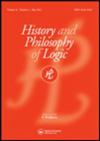What Follows from the Impossible: Everything or Nothing? (An Interpretation of the ‘Avranches Text’ and the Ars Meliduna)
IF 0.5
3区 哲学
Q3 HISTORY & PHILOSOPHY OF SCIENCE
引用次数: 1
Abstract
One of the main controversies of the Logic Schools of the 12th century centered on the question: What follows from the impossible? In this paper arguments for two diametrically opposed positions are examined. The author of the ‘Avranches Text’ who probably belonged to the school of the Parvipontani defended the view that from an impossible proposition everything follows (‘Ex impossibili quodlibet’). In particular he developed a proof to show that by means of so-called ‘disjunctive syllogism’ any arbitrary proposition B can be logically derived from a pair of contradictory propositions A and Not-A. The author of the Ars Meliduna instead argued that nothing follows from an impossible proposition (‘ex falso nihil sequitur’). This view is supported by various counterexamples which aimed to show that the admission of impossible premises would give rise to inconsistent conclusions. Upon closer analysis these inconsistencies do not, however, have the formal structure of a real contradiction like A and Not-A, but rather the structure of two rivalling conditionals like ‘If B then A’ and ‘If B then Not-A’. Hence these counterexamples rather have to be considered as refutations of the basic principles of ‘connexive logic’.不可能的结果是什么:一切都有还是什么都没有?(《Avranches Text》与《Ars Meliduna》解读)
12世纪逻辑学派的主要争论之一集中在这个问题上:从不可能中得出什么?本文讨论了两个截然相反的论点。《Avranches Text》的作者可能属于Parvipontani学派,他捍卫了这样一种观点,即从一个不可能的命题中得出一切(Ex impossibili quodlibet)。他特别提出了一个证明,证明通过所谓的"析取三段论"任何命题B都可以从一对矛盾命题a和非a中逻辑地推导出来。相反,《阿斯·梅利杜纳》的作者认为,不可能的命题没有任何结果(“ex falso nihil sequitur”)。这种观点得到了各种反例的支持,这些反例旨在表明,承认不可能的前提将导致不一致的结论。然而,仔细分析一下,这些矛盾并不具有像a与非a那样的真实矛盾的形式结构,而是具有像"如果B则a "和"如果B则非a "这样的两个对立条件的结构。因此,这些反例更应该被看作是对“连接逻辑”基本原则的反驳。
本文章由计算机程序翻译,如有差异,请以英文原文为准。
求助全文
约1分钟内获得全文
求助全文
来源期刊

History and Philosophy of Logic
综合性期刊-科学史与科学哲学
CiteScore
0.80
自引率
0.00%
发文量
24
审稿时长
>12 weeks
期刊介绍:
History and Philosophy of Logic contains articles, notes and book reviews dealing with the history and philosophy of logic. ’Logic’ is understood to be any volume of knowledge which was regarded as logic at the time in question. ’History’ refers back to ancient times and also to work in this century; however, the Editor will not accept articles, including review articles, on very recent work on a topic. ’Philosophy’ refers to broad and general questions: specialist articles which are now classed as ’philosophical logic’ will not be published.
The Editor will consider articles on the relationship between logic and other branches of knowledge, but the component of logic must be substantial. Topics with no temporal specification are to be interpreted both historically and philosophically. Each topic includes its own metalogic where appropriate.
 求助内容:
求助内容: 应助结果提醒方式:
应助结果提醒方式:


